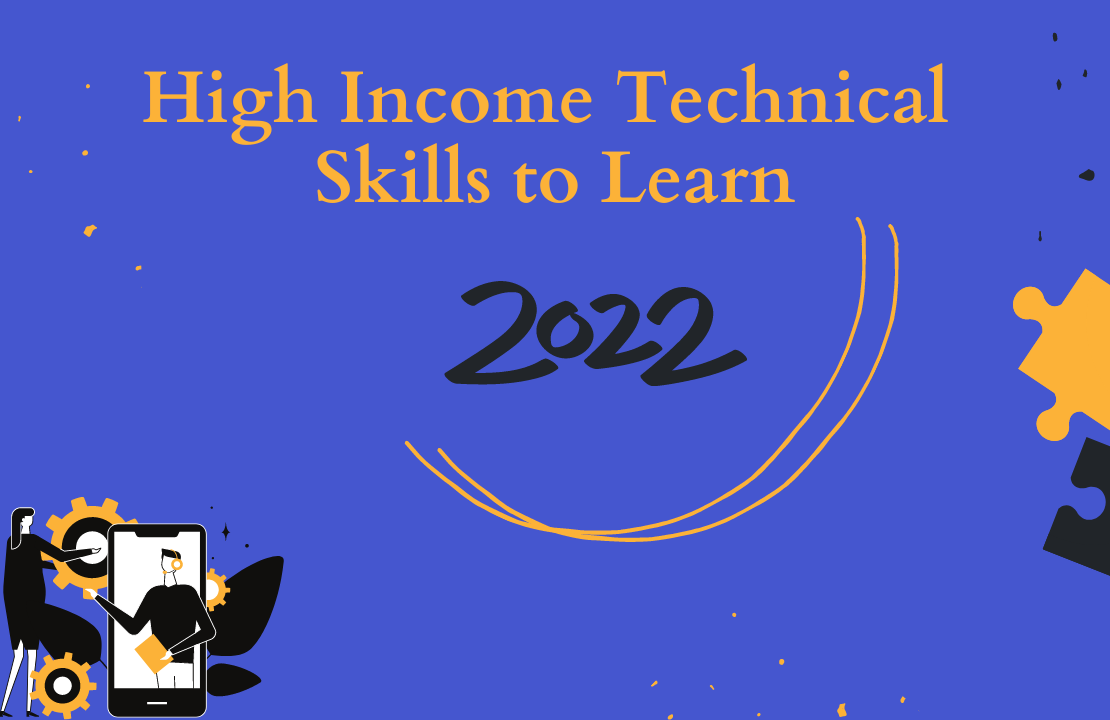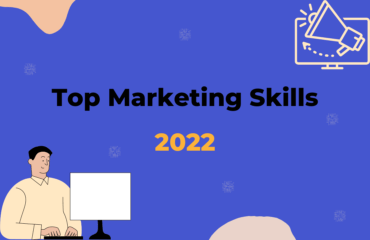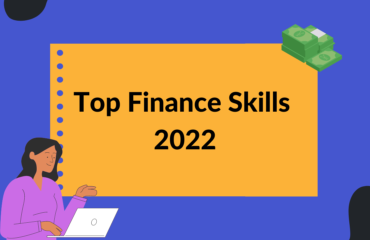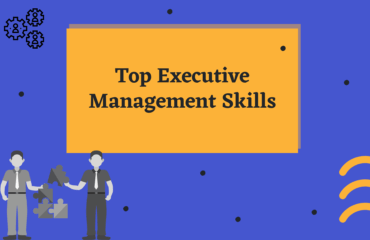Table of Contents
Whether you are targeting to switch careers or give your existing career a push, learning and up-skilling are key. While information is more accessible than ever, learning is only helpful if it is aligned with industry trends. As we enter 2022, here are 7 high-income technical skills to keep in mind:
- Project management
- Software development
- Data literacy
- Digital marketing
- Content creation & community building
- Design thinking
- Blockchain
1) Project Management
Till the last decade, project management was considered to be a profession rather than a technical skill. But by the end of the current decade, project management is expected to penetrate all departments and industries, making it an essential skill to learn. Experts assert that organizations are going to move from operations-based value creation, i.e. running a company, to project-based value creation, which focuses on generating deliverables. In turn, job roles are going to change from department-based to project-based. By 2027, almost 88 million people are going to be working in a project-based role, contributing $20 trillion to the global economy.
However, at present, out of all the projects undertaken globally, only 35% of them are successful. In other words, an overwhelming amount of resources goes to waste. This demonstrates a lack of skilled project managers. In a project-driven economy, leaders need to bear the following qualities to propel their careers forward:
- Project management methodologies
- Product development & subject matter expertise
- Strategy and business acumen
- Leadership & change management skills
- Agility and adaptability
- Ethics & values
There are many academic and online certification programs to learn more about project management.
2) Software Development Skills
Without surprise, IT has been a high-paying industry for the past two decades. But due to the sudden and large-scale shift to remote work, organizations are forced to revamp their digital infrastructure, increasing the demand for software and app developers further. While the traditional degrees are still helpful to hold a job in IT, companies are increasingly hiring candidates who learned to code outside of the conventional path. If you’re interested in boosting your tech skills, keep reading.
The US Bureau of Labour statistics lists computer & information systems roles among the top 20 highest-earning professions. So, if you are looking to change careers, learning a coding language may be the right move. Popular languages include Java, JavaScript, Python, PHP, and C++.
If you are already in the IT profession and looking to give your career a push, an emerging trend in the industry is hyper-automation. Hyper-automation is an approach through which organizations identify, vet, and automate many business processes using technologies like AI, low-code application platforms (LCAP), robotic process automation (RPA), and virtual assistants. Gartner Inc. estimates that the market for hyper-automation enabling technologies will reach $600 billion in 2022. Also, these technologies are considered to be process-agnostic software, making them useful in multiple IT & business use cases in any industry. There are several online courses and products on RPA, LCAP, and AI to learn more about hyper-automation.
3) Data Literacy
Data analytics has been a growing field throughout the past decade, but now organizations are looking to put all the available data to use. Advancements in machine learning (ML) and consequently, artificial intelligence (AI), sparked a global demand for data. An AI requires to go through millions of data entries to build its understanding and provide solutions. And as more and more companies are starting to rely on hyper-automation for repetitive tasks, the need for data literacy is penetrating all aspects of the business.
A study found that 93% of business leaders believe that data literacy is vital for their company, but only 24% of the global workforce consider themselves competent to work with, analyze, and understand data. Skills in SQL, data extraction, big data analysis, and R (programming language) are less in demand, as most of these technologies can now be embedded into the data platforms. According to HBR, organizations are now suffering from a lack of data-driven problem-solving skills.
More specifically, employees are lacking the skills to:
- Ask the right questions
- Understand which data is relevant and how to test the validity of the data they have
- Interpret the data well, so the results are useful and meaningful
- Test hypotheses using A/B tests to see what results pan out
- Create easy-to-understand visualizations so leaders understand the results
- Tell a story to help decision-makers see the big picture and act on the results of the analysis
Check out the data literacy course developed by Johns Hopkins University faculty on Coursera to start your learning journey.
4) Digital Marketing
With the rise in digital content consumption, a new face of marketing has emerged, digital marketing. It is basically the promotion of a product or service using the internet or through the internet using devices, such as computers, mobile phones, and other digital devices. In response to the accelerated digital migration of work and other activities caused by Covid-19, companies have shifted their advertising budget to digital platforms further.
A report from Mckinsey and Co. shows the impact of digital marketing across industries, including financial services and telcos. Financial institutions recorded a 5x increase in digital sales while telcos reported a 50-165% increase in conversion rates using digital marketing, signifying its importance and potential.
The skills required to succeed in the digital marketing era are:
- Search Engine Optimization (SEO)
- Search Engine Marketing (SEM)
- Data-driven marketing
- E-commerce marketing
- Social media marketing
- Social media optimization
- Display ads
- Email marketing
- Copywriting
There are multiple online programs suggested by Forbes to boost your digital marketing skills and give your income a boost.
5) Content Creation & Community Building
Digital content creation was on a steady rise even before the pandemic, and it is projected to steadily rise further. Digital content includes any content, textual, audio, video, and graphical, which is consumed through digital devices. Its benefits in comparison to other marketing tools, such as cost-effectiveness, flexibility, and scalability, make it unique and fuel its growth. Also, the constant improvement in the processing power of social media apps, such as TikTok and Instagram, makes digital content creation more convenient and accessible than ever before. The digital content creation market size is expected to increase up to $38.2 billion by 2030. The skills required to succeed as a digital content creator are:
- Expertise in a subject/topic/field
- Video production and editing
- Audio production and editing
- Graphic designing
- Digital marketing
- Writing skills
- Web designing
Content creators who have a dedicated social media following in their niche are approached by brands for the promotion of their products and services. Creators with a big following can influence consumer behavior, which has earned them the title influencer. Influencer marketing is set to cross the $14 billion mark entering 2022.
Some businesses also use digital marketing to create a community for their brands or a particular product. A great example is OnePlus, a relatively new Chinese smartphone manufacturer, which has engaged with its customers through social media platforms for years and now enjoys a dedicated fan following in the South Asian market.
While videos, audios, podcasts, and blogs are the established pathways for digital content, e-learning is slowly emerging as one of the biggest contributors to the market. Remote working also kickstarted the remote learning industry, with online courses popping up to cater to every skill, knowledge, and information. Since the outbreak of the Covid-19 pandemic, the online learning market has seen significant growth. Learning and upskilling are the new language of career growth and are essential for staying relevant in the current job market. If you want to learn more, there are many content creation courses available, such as the content creation masterclass from Udemy.
6) Design Thinking
Design thinking is a process for solving problems through creative solutions with a human-centered core. It can be used to design services, products, and processes, balancing the needs of the users with technological and economical feasibility. People skilled in design thinking are able to use designers’ tools to address a vast range of organizational challenges.
According to a Forbes Insights survey, out of 328 organizations, 39% have adopted the design thinking concepts, which directly resulted in organizational growth. The aim of design thinking is not just to solve a problem, but to solve it in a way that will result in the highest possible satisfaction for the user. With such a wide range of applications for design thinking, it’s an imperative skill for today’s leaders.
A four-step approach developed by professors at Kellogg School of Management for adopting design thinking:
- Get Better at “noticing things”
- Frame and reframe the problem
- Approach brainstorming with rigor
- Fail faster. Learn sooner
There are many relevant courses and certifications courses on Ideo U, which is a global design company offering real-world learning from their business experience.
7) Blockchain
Blockchain is an unchanging, shared ledger that records transactions and tracks assets in a business network. It is a technology used to store and track information on the transaction of assets, which can be tangible (like currency, land, etc) or intangible (like patents, branding, copyrights, etc).
The application of blockchain is not just limited to finance. The technology can be applied to any closed network where visibility and traceability are required for multi-step transactions of any kind. The market for blockchain is projected to increase from $4.68 bn in 2021 to $104.19 bn in 2028. Blockchain is a growing field and one of the top skills to learn in 2022. As countries look to regulate cryptocurrencies, the applications for blockchain technology have increased in business and commerce.
If you are interested in learning more about blockchain technology, check out courses from IBM and some free courses recommended by Harvard Technology & Entrepreneurship Center.








